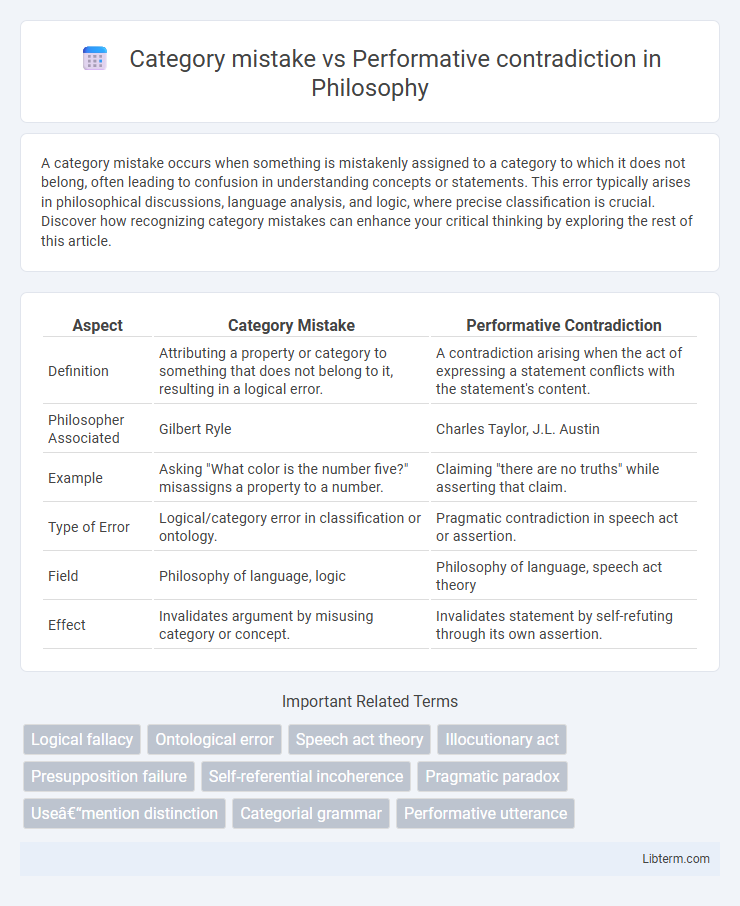A category mistake occurs when something is mistakenly assigned to a category to which it does not belong, often leading to confusion in understanding concepts or statements. This error typically arises in philosophical discussions, language analysis, and logic, where precise classification is crucial. Discover how recognizing category mistakes can enhance your critical thinking by exploring the rest of this article.
Table of Comparison
| Aspect | Category Mistake | Performative Contradiction |
|---|---|---|
| Definition | Attributing a property or category to something that does not belong to it, resulting in a logical error. | A contradiction arising when the act of expressing a statement conflicts with the statement's content. |
| Philosopher Associated | Gilbert Ryle | Charles Taylor, J.L. Austin |
| Example | Asking "What color is the number five?" misassigns a property to a number. | Claiming "there are no truths" while asserting that claim. |
| Type of Error | Logical/category error in classification or ontology. | Pragmatic contradiction in speech act or assertion. |
| Field | Philosophy of language, logic | Philosophy of language, speech act theory |
| Effect | Invalidates argument by misusing category or concept. | Invalidates statement by self-refuting through its own assertion. |
Introduction to Category Mistake and Performative Contradiction
Category mistake occurs when an object or concept is incorrectly assigned to a category to which it does not belong, leading to a fundamental logical error in understanding or communication. Performative contradiction arises when the content of a statement conflicts with the conditions required for the act of making that statement, undermining the speaker's claim through self-refutation. Both errors highlight different ways in which language and logic can fail, emphasizing the importance of coherent categorization and speech acts in philosophical analysis.
Defining Category Mistake
A category mistake occurs when a concept or term is assigned to a category to which it does not belong, leading to a logical error in understanding or communication. This error arises from misclassifying entities, such as treating abstract concepts like "justice" as tangible objects or confusing the properties of different categories. Defining category mistakes clarifies the boundaries of meaningful categories and prevents fundamental misunderstandings in philosophy, linguistics, and cognitive science.
Defining Performative Contradiction
Performative contradiction occurs when the content of a statement contradicts the act of stating it, undermining its own validity. Unlike a category mistake, which misattributes properties to an object outside its logical category, a performative contradiction arises when the speaker's action of making a claim refutes the claim itself. This logical inconsistency highlights errors in language use where the performative aspect invalidates the propositional content.
Origins and Philosophical Context
Category mistakes originate from Gilbert Ryle's critique of Cartesian dualism, highlighting errors where things are wrongly assigned to incompatible logical categories. Performative contradictions emerge within speech act theory, notably developed by J.L. Austin and further analyzed by philosophers like Robert Brandom, reflecting situations where the content of a statement conflicts with the act of asserting it. Both concepts arise from 20th-century analytic philosophy debates on language, meaning, and logical form, emphasizing the intricate relationship between how language is used and the philosophical implications of misuse or contradictory speech acts.
Key Differences Between Category Mistake and Performative Contradiction
Category mistake occurs when someone assigns a property or category to something that cannot logically possess it, such as treating an abstract concept like a physical object. Performative contradiction arises when the content of a statement contradicts the act of asserting it, undermining its own validity through self-reference. The key difference lies in category mistake being a logical error about classification, while performative contradiction is a pragmatic failure in the act of communication itself.
Common Examples of Category Mistakes
Common examples of category mistakes include treating abstract concepts as physical objects, such as asking "What color is the number seven?" or assuming "the university" refers solely to its buildings rather than the collective institution encompassing staff and students. These errors confuse categories by attributing properties to entities that logically cannot possess them, like stating "The theory is hungry." In contrast, performative contradictions occur when the content of a statement directly contradicts the act of asserting it, making category mistakes more about linguistic categorization errors than self-defeating speech acts.
Typical Cases of Performative Contradiction
Typical cases of performative contradiction occur when a speaker's actions or statements inherently undermine the content of their claim, such as asserting "I cannot speak English" while clearly speaking English. This contradiction arises because the act of making the statement contradicts the proposition expressed, highlighting a failure in the performative aspect of communication. Unlike category mistakes which confuse different logical types, performative contradictions expose inconsistencies between the performative act and its propositional content.
Implications in Logic and Philosophy
Category mistakes involve attributing properties to entities that cannot possess them, challenging the coherence of propositions in logic and undermining conceptual analysis in philosophy. Performative contradictions occur when the act of asserting a statement contradicts the content of the statement itself, exposing self-defeating claims and impacting epistemic justification. Both phenomena highlight limits on meaningful discourse and the criteria for rational belief formation in philosophical logic.
Relevance in Contemporary Discourse
Category mistakes confuse concepts by attributing properties to incompatible categories, undermining logical clarity in debates. Performative contradictions occur when a statement contradicts the act of its own assertion, challenging the speaker's credibility. Both are crucial in contemporary discourse for ensuring coherent argumentation and avoiding fallacious reasoning that can derail meaningful communication.
Conclusion: Distinguishing the Two Concepts
Category mistakes involve misclassifying a concept within an incorrect ontological category, leading to confusion about the nature of the subject. Performative contradictions occur when the content of a statement conflicts with the act of asserting it, undermining the speaker's credibility. Distinguishing these concepts requires recognizing that category mistakes pertain to semantic errors in classification, whereas performative contradictions arise from pragmatic inconsistencies in speech acts.
Category mistake Infographic

 libterm.com
libterm.com